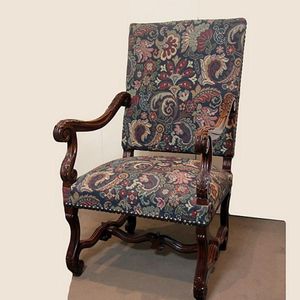19th Century Louis XV-style Fauteuil Chair
You must be a subscriber, and be logged in to view price and dealer details.
Subscribe Now to view actual auction price for this item
When you subscribe, you have the option of setting the currency in which to display prices to $Au, $US, $NZ or Stg.
- Rosewood - A dense timber that varies in shade to very light brown to almost black. When rosewood is cut and sanded the colour of the timber will turn black, and after polishing and exposure to daylight, the surface will gradually lighten over time to light brown with black streaks.
The name comes from the odour emanating from the timber when it is planed, sanded or cut.
Rosewood was very popular for use in Victorian furniture in the second half of the 19th century, and at that time most of the rosewood was imported from Brazil. However it also grows in India and Indonesia.
It is used in the sold for chairs and table legs, but for carcase furniture such as side cabinets and bookcases, and for table tops it is always used as a veneer. - Cabriole Leg - The cabriole leg evolved from an elongated scroll, curving out at the knee which may or may not be carved, and forming a serpentine shape as it descends to the foot.
First introduced into English furniture in the late 17th century, cabriole legs were widely used during the Queen Anne and early Georgian periods, where they frequently terminated in a pad foot or ball and claw foot. The style has had many imitators since then. The cabriole leg was re-introduced in the mid-19th century, and is commonly associated with the balloon-back dining or drawing-room chairs made in walnut, mahogany or, in Australia, cedar. The Victorian cabriole leg, on the whole, was rather more slender than the earlier form, following the French style, which emphasized the delicacy and daintiness of the chairs they were designed to support. Cabriole legs are sometimes found on windsor chairs, especially those made during the 18th century.
This item has been included into following indexes:
-
chairs, singles / pairs / threes, style or period
- fauteuils (arm chairs) 244
- French 962
- Victorian, other styles 1,208
- chairs, singles / pairs / threes, timber
Visually similar items

A pair of decorative Chinese rosewood ornately carved elbow chairs

An extensively carved French oak arm chair with barley twist supports, French tapestry covers

French Louis XIV style oak fauteuil, with a padded back and armrests on scroll supports, with a padded seat on short turned carved legs, with carved stretcher

A Queen Anne walnut wing armchair, circa 1710, the padded shaped back, shaped wings and outscrolled arms standing on walnut cabriole legs carved with cartouche motif at the knees, upholstered in exceptionally fine petit and gros point tapestry with figures
